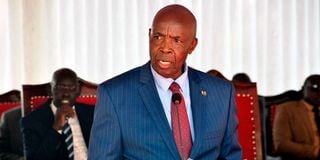State urges private schools to reduce tuition fees

Education Cabinet Secretary Ezekiel Machogu.
What you need to know:
- Education Cabinet Secretary Ezekiel Machogu decried the high cost of private schools urging the owners to reduce the cost of education
- Lower cadres of private primary schools charge tuition fees between Sh15,000 to Sh30,000 per term
- Middle cadre schools charge from Sh30,000 to Sh100,000 while upper charge from Sh100,000 and above
Barely a week before schools reopen for second term, the state now wants proprietors of private education institutions to reduce school fees.
Education Cabinet Secretary Ezekiel Machogu decried the high cost of private schools urging the owners to reduce the cost of education to enable more learners to access quality education.
Lower cadres of private primary schools charge tuition fees between Sh15,000 to Sh30,000 per term. Middle cadre schools charge from Sh30,000 to Sh100,000 while upper charge from Sh100,000 and above.
The children from the above schools, unlike their counterparts in public schools who don’t pay tuition fees, enjoy quality education, foreign languages, extra-curricular activities like swimming, chess among other sports.
Mr Machogu termed the Kenya Private Schools Association as a valued partner in the pursuit of delivering quality education to every child in Kenya.
The CS said by fostering open dialogue, working collaboratively, and finding innovative solutions they can create an educational ecosystem that is efficient, sustainable, and inclusive.
“That is why I urge you to work with the government to help reduce the operational cost of private schools, making quality education more accessible for all,” said the CS in a speech read on his behalf by the Coast regional education director, Mr Lucas Kangongo.
Kenya Private Schools Association (KPSA) chairman, Mr Charles Ochome, said the stakeholders will collaborate with the state to enhance learning.
“We charge our schools fees as per the operational costs. If the state can reduce operational costs it will automatically lower school fees,” he said.
Speaking during the Kenya Private Schools Association (KPSA) Annual General Meeting on Friday, the CS lauded the stakeholders for providing quality education.
“It has greatly contributed to the many achievements we have made in the sector. We recognize the need to bridge the gap and ensure issues of efficiency, relevance, quality, access and equity are addressed,” said the CS.
He said the government has worked closely with the association to ensure that the 100 per cent transition policy from primary to secondary education succeeds, thanks to the students enrolled in their institutions.
The CS said this year’s theme, "Re-evaluating of future private schools in the wave of education reforms” resonates deeply with the Ministry of Education.
“As a government, we remain committed to fostering a collaborative environment where both public and private institutions can thrive. We remain committed to ensuring the full inclusion of the KPSA in government processes that directly affect your operations,” he added.
The CS assured the owners of private schools that the government is determined to ensure crucial decisions that affect them consider their input.
He said his ministry will also ensure their voices are heard.
“You may recall that your membership has been involved in the rollout of the Competency-Based Curriculum process, which has now reached the Junior Secondary School,” said the CS.
He said during the period of the Covid-19 pandemic between 2020 to 2022, the association was at the centre of the team that made the critical decisions on how to navigate through the school's crisis.
“I assure you that this trend shall continue. Your expertise and insights are essential in shaping a future where public and private schools work hand-in-hand for the betterment of Kenyan education,” said the CS.
He said the Kenyan Constitution, in Article 53(b), emphasises the state's obligation to facilitate access to education at all levels.
“This includes fostering a partnership with stakeholders in the education sector, such as the association. By working together, we can ensure a more inclusive and equitable education system for all Kenyan children,” he added.
The Ministry also wants private schools to adopt clean energy.
The CS said private schools play a crucial role in leading the charge towards a greener tomorrow.
“We are committed to supporting your efforts by advocating for tax concessions on the purchase and installation of renewable energy solutions like solar panels and LPG,” said the CS.
He said the initiative will not only benefit the environment but also translate into significant cost savings for your schools.
The CS said classrooms should be powered by the sun, to reduce dependence on expensive and environmentally harmful fossil fuels.
“Let us work together to make sustainability a cornerstone of our educational system.
Mr Machogu wants the annual general meeting to be a turning point in their collaborative journey.
“Let us seize this opportunity to build bridges, break down barriers, and work together to create a world-class education system that empowers every child in Kenya to reach their full potential,” he added.
However, proprietors of private education institutions insist their operational cost is expensive forcing them to impose the charges on parents.





